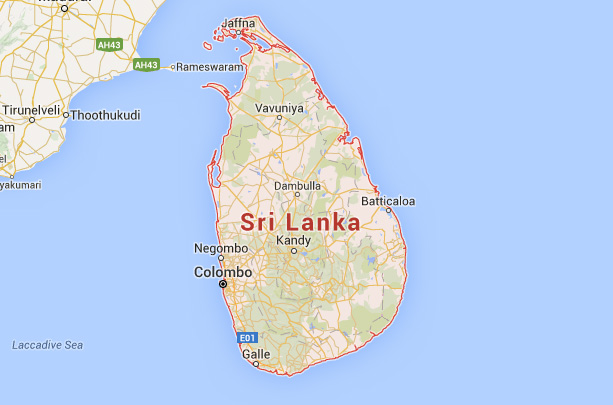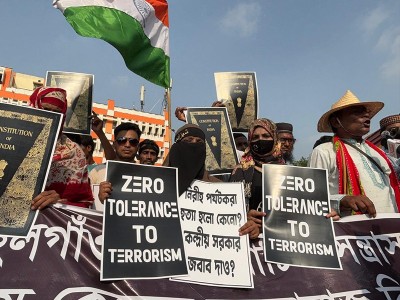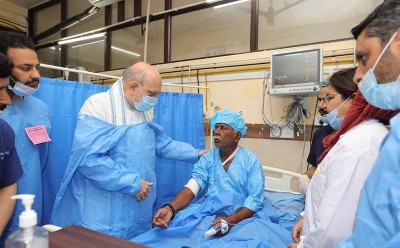
A Year of Promises
Earlier, on January 9, 2016, the Sri Lankan Parliament began a process to formulate a new Constitution with Prime Minister Wickremesinghe presenting a resolution to set up a Constitutional Assembly (CA) of all members for the purpose: "We will have the whole Parliament formulating the Constitution unlike the previous instances when the Constitutions were drafted outside Parliament." The new Constitution will replace the Constitution adopted in 1978.
Similarly, President Maithripala Sirisena declared, in his address, that the time had come to formulate a new Constitution in keeping with the demands of the 21st Century, but also warned that extremist elements both in the south and the north may try to scuttle the process.
In another development, which is expected to have a far reaching impact on the reconciliation process, President Sirisena promised, on January 3, 2016, to provide land to settle internally displaced persons (IDPs): "It is an ambitious target, but I will see that all the internally displaced people are given land to build homes... For many people the main issue was lack of land and that is something we will resolve in the next six months." He added that he would travel to Jaffna this month to formally hand over about 700 acres of land as part of the plan. Most of the resettled families are still staying in welfare camps and want to be resettled in their original places of dwelling.
These developments are in continuation with what was witnessed through 2015. The 'year of renewed hope', as 2015 was described, commenced with a dramatic turnaround of political fortunes in the island nation. Pallewatte Gamaralalage Maithripala Yapa Sirisena, leader of the New Democratic Front (NDF), emerged victorious in a keenly contested Presidential Election held on January 8, 2015. Sirisena secured 6,217,162 votes (51.28 per cent) against 5,768,090 votes (47.58 per cent) polled by Mahinda Rajapaksa, the incumbent President and candidate of the United People's Freedom Alliance (UPFA). Sirisena took oath as the Seventh Elected Executive President of the country on January 9. The NDF is a conglomeration of several political formations opposing the UPFA, including the main opposition United National Party (UNP). UNP leader Ranil Wickremesinghe became the new Prime Minister, replacing D.M. Jayaratne.
Later, in the Parliamentary Elections held on August 17, 2015, voters gave a fractured mandate, with none of the parties securing a simple majority. UNP, led by incumbent PM Wickremesinghe, secured 106 seats, falling seven short of simple majority in a 225-memebr House; the SLFP secured just 95 seats. The main Tamil political party, the Tamil National Alliance (TNA) won 16 seats; and the main Marxist party, Janatha Vimukthi Peramuna (JVP, People's Liberation Front) won six.
However, following a historic agreement on August 20, 2015, between UNP and the Sri Lanka Freedom Party (SLFP) to sign a Memorandum of Understanding (MoU), the incumbent PM Wickremesinghe on August 21, 2015, took oath as the 26th Prime Minister of the island nation. Wickremesinghe was sworn in as Prime Minister for the fourth time [having served earlier tenures between May 17, 1993, and August 19, 1994; December 9, 2001, and April 2, 2004; and January 9, 2015, and August 20, 2015]. Later in the day, the MoU was signed by the two parties.
UNP and SLFP are the two major political forces in Sri Lanka, with a long history of bitter rivalry, and who engaged fiercely in the Parliamentary Elections on August 17, 2015. However, they reached a compromise as equations within the SLFP had changed dramatically. The party has virtually split into two factions - one led by Sirisena and the other led by Mahinda Rajapaksa. It was during the January 2015 Presidential Elections that Sirisena revolted against his political master, then incumbent President Rajapaksa, who was also the head of SLFP. Though Sirisena was expelled from the party, he contested a successful election against Rajapaksa as a 'common candidate' for NDF. Subsequent to his loss, Rajapaksa resigned as the head of SLFP and was succeeded by Sirisena. The latter, however, failed to establish full authority over the party. This became apparent when Rajapaksa successfully contested the Parliamentary Elections as the 'Prime Ministerial candidate' of the SLFP, despite Sirisena's direct opposition. Though reports indicated that most of SLFP's new Members of Parliament (MPs) were Rajapaksa supporters, the split verdict had put them in a quandary and forced them to seek a compromise.
Though Rajapaksa had faced mounting criticism for exercising unbridled power, the country had seen all-round development during his tenure, more so after the restoration of peace following Liberation Tigers of Tamil Eelam (LTTE)'s defeat. This included dramatic progress in the Northern Province, the epicentre of war, where, according to the Central Bank of Sri Lanka, the highest rate of economic growth was recorded, with Provincial Gross Domestic Product (GDP) growth of 27.8 per cent, as against a national average of 8.3 per cent in 2011; and 25.9 percent in 2012, as against a national average of 6.4 per cent. His failure was in his inability to address the issue of national reconciliation, despite sustained rhetoric on the subject.
Rajapaksa's immediate response to the outcome of the Parliamentary elections of 2010 had been encouraging: "The assured majority in Parliament given by the voters encourages the Government to proceed with its policies for the strengthening of peace and reconciliation, reconstruction, greater infrastructure development, increased investment in identified areas of growth, and the overall development of the country to make it the centre of economic and social progress in South Asia." His Government had also successfully rehabilitated most of the former LTTE cadres, with only 49 hardcore LTTE cadres out of 11,800, remaining in detention centres; and resettled all most all the 263,221 IDPs. Nevertheless, his talks on reconciliation, particularly with the main Tamil party, the TNA, were always marred by suspicion, and had remained stalled since January 27, 2012.
Although the talks between the TNA and the new Government are yet to begin, TNA spokesman M. A. Sumanthiran had stated on September 4, 2015, "We will talk to the Government straightaway with a view to resolving the long outstanding matter," adding that the Tamil people were happy with the appointment of TNA leader R. Sampanthan as the Opposition Leader of Parliament. TNA was recognized as the Main Opposition and its leader Sampanthan was designated as Opposition Leader on September 3, 2015. Prior to this, Tamil United Liberation Front (TULF) leader A. Amirthalingam was the only Tamil politician who had served as Opposition Leader (from 1977 to 1983). Sampanthan was also an MP of the main opposition at that time.
Also welcoming Colombo's decision to co-sponsor a draft resolution (A/HRC/30/L.29) that was tabled at the 30th session of the United Nations Human Rights Council (UNHRC) in Geneva, the TNA in a statement on September 25, 2015, declared, "We are of the view that the draft provides a constructive starting point for what will inevitably be a long road to reconciliation."
Indeed, in a significant shift in policy, on September 24, 2015, Colombo had decided to co-sponsor the draft resolution titled 'Promoting reconciliation, accountability and human rights in Sri Lanka', based on the findings of the OISL [OHCHR (Office of the United Nations High Commissioner for Human Rights) Investigation on Sri Lanka]. The draft resolution had mentioned "the importance of participation in a Sri Lankan judicial mechanism, including the Special Counsel's office, of Commonwealth and other foreign judges, defence lawyers, and authorized prosecutors and investigators".
Buckling under domestic pressure, however, Colombo backtracked later, as PM Wickremesinghe on September 27, 2015, declared that Sri Lanka's domestic mechanism to probe the alleged rights abuses during the military conflict with the LTTE cannot have foreign judges due to constitutional impediments, and that his Government could "only act within the framework of the Sri Lankan Constitution, which does not allow foreign judges to operate in the country." He added, however, "Sri Lanka will seek the consultations of foreign judges and lawyers for the domestic mechanism to probe the alleged rights violations."
Though Colombo was forced to backtrack from its original position, even conceding to consultation with "foreign judges and lawyers for the domestic mechanism" demonstrated its resolve to placate the Tamils. The Tamils recognize the Government's compulsions - in case Rajapaksa, who will be at receiving end if foreign judges join investigations, chooses to create political instability in an effort to secure control of the Government after a hiatus. Significantly, the previous Rajapaksa regime had vehemently opposed a strident campaign by the international community, particularly western nations, to interfere in the country's internal affairs in the guise of 'investigation of war crimes' through the adoption of such resolutions.
The peace attained after a bloody endgame that terminated in the comprehensive defeat of the LTTE in May 2009, has been sustained through 2015. Sri Lanka did not record a single incident of killing in 2015, a trend evident since November 2009, barring a lone of incident reported in 2014, when on April 11, a Security Forces (SFs) team had launched a cordon and search operation in the forest area off Padaviya in Anuradhapura District. The unit was fired upon by militants hiding in the forest. SFs killed three armed local LTTE leaders, reportedly in retaliatory fire.
Developments through 2015 and early 2016 suggest greater stabilization and reinforce prospects for an enduring peace in Sri Lanka. Challenges remain, of course, and international pressures have been distorting processes of reconciliation for some time now. The drafting of a new Constitution offers both a challenge and an opportunity to address the grievances of a long, twisted and violent history.
Support Our Journalism
We cannot do without you.. your contribution supports unbiased journalism
IBNS is not driven by any ism- not wokeism, not racism, not skewed secularism, not hyper right-wing or left liberal ideals, nor by any hardline religious beliefs or hyper nationalism. We want to serve you good old objective news, as they are. We do not judge or preach. We let people decide for themselves. We only try to present factual and well-sourced news.







